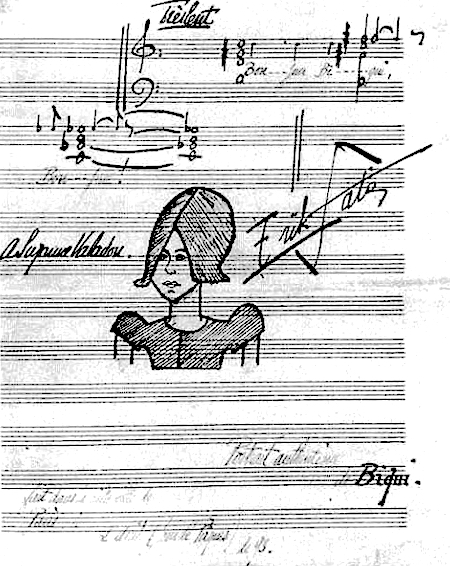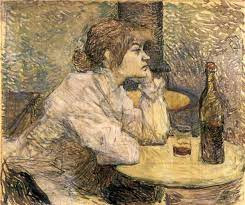Sunday, April 17, 2022
Saturday, April 02, 2022
Bonjour Biqui, Bonjour - happy 129th anniversary!
According to Wikipedia:
When Pierre-Daniel Templier (1905-1987) published the first Satie biography in 1932, Valadon was still living, and the author omitted any direct mention of her relationship with the composer. He simply noted, "Women did not play an important part in Satie's life. As a mature man, he was not known to have had any affairs."
However, Templier included a facsimile of the complete Bonjour Biqui, Bonjour! manuscript - its first appearance in print - which by its intimate nature served as a tacit acknowledgement of this youthful liaison. The facsimile was republished in Rollo H. Myers' English-language biography (1948), but as Valadon had died in 1938 Myers felt free to identify her as Satie's one "affaire du coeur" ("affair of the heart").
I take issue with this passage in the Wiki page:
(the score is) accompanied by a drawing of an innocent-looking Valadon Satie subtitled an "Authentic Portrait of Biqui". One need only compare it to Valadon's self-portrait of the same year or her depiction in Toulouse-Lautrec's painting The Hangover (c. 1889) to appreciate the extent of Satie's idealization. The sketch and Satie's bold, angular signature beside it dominate the composition, in which the different elements (music, text, drawing) are carefully arranged on the page for visual effect.
I don't think the cartoony sketch of Valadon on the manuscript of "Bonjour Biqui, Bonjour" is in any way "idealized."
She looks like a queen from a deck of playing cards, but with a weirdly elongated head and her shoulders and arms hanging far away from her body. This is the Queen of Clubs from a deck from around 1900.
And what an unfair comparison - a cartoony sketch as the idealized version, versus the author's representation of a "non-idealized" version, a profile view of Valadon in a picture called "The Hangover."
In my play LE CHAT NOIR, Bonjour Biqui Bonjour was written before the Cher Petite Biqui letter, but BBB, based on the date on the manuscript came after. April 2, 1893 was Easter Sunday.
Which is a good time to mention the David Sedaris piece that discusses how the French celebrate Easter. An excerpt:
"Easter is a party for to eat of the lamb," the Italian nanny explained. "One, too, may eat of the chocolate.""And who brings the chocolate?" the teacher asked.I knew the word, and so I raised my hand, saying, "The Rabbit of Easter. He bring of the chocolate."My classmates reacted as though I'd attributed the delivery to the Antichrist. They were mortified."A rabbit?" The teacher, assuming I'd used the wrong word, positioned her index fingers on top of her head, wiggling them as though they were ears. "You mean one of these? A rabbit rabbit?""Well, sure," I said. "He come in the night when one sleep on a bed. With a hand he have the basket and foods."The teacher sadly shook her head, as if this explained everything that was wrong with my country. "No, no," she said. "Here in France the chocolate is brought by the big bell that flies in from Rome."I called for a time-out. "But how do the bell know where you live?""Well," she said, "how does a rabbit?"It was a decent point, but at least a rabbit has eyes. That's a start. Rabbits move from place to place, while most bells can only go back and forth--and they can't even do that on their own power. On top of that, the Easter Bunny has character; he's someone you'd like to meet and shake hands with. A bell has all the personality of a cast-iron skillet. It's like saying that come Christmas, a magic dustpan flies in from the North Pole, led by eight flying cinder blocks. Who wants to stay up all night so they can see a bell? And why fly one in from Rome when they've got more bells than they know what to do with right here in Paris? That's the most implausible aspect of the whole story, as there's no way the bells of France would allow a foreign worker to fly in and take their jobs. That Roman bell would be lucky to get work cleaning up after a French bell's dog--and even then he'd need papers. It just didn't add up.
Posted by
Nancy
Subscribe to:
Posts (Atom)




